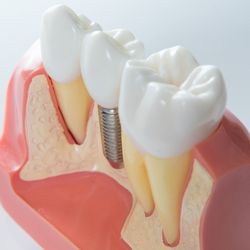
A missing tooth doesn’t just affect the appearance of your smile — it can also be a source of dental problems down the road. Specifically, that empty space presents an opportunity for teeth to shift and promotes bone loss in your jaw. Dr. Tris J. Carta recommends dental implants for many patients who are missing teeth, and the Manchester, CT, dentist explains the different types available to you.
Endosteal Implants
The most common type is known as an endosteal implant. It involves placing a titanium post directly into the gum line to attach to the jawbone. After placement, gum tissue will heal and the jaw will form around the post, making it secure. After the healing is complete, the dentist will affix a prosthetic tooth to the metal. This solution can help you maintain facial structure and jawbone integrity.
Subperiosteal Implants
 When you have a weak or diminished jaw bone, the endosteal method may not provide the secure fit required of a replacement tooth. To avoid connection with the jaw bone, a dentist may recommend subperiosteal dental implants as an alternative. Instead of being placed directly through the gum into the socket, this option involves placing a metal frame over the top of the jaw bone and allowing the gum tissue to heal over it. Once it’s fixed within the gums, prosthetic teeth are attached.
When you have a weak or diminished jaw bone, the endosteal method may not provide the secure fit required of a replacement tooth. To avoid connection with the jaw bone, a dentist may recommend subperiosteal dental implants as an alternative. Instead of being placed directly through the gum into the socket, this option involves placing a metal frame over the top of the jaw bone and allowing the gum tissue to heal over it. Once it’s fixed within the gums, prosthetic teeth are attached.
Choosing the right type of dental implant for you will determine its success. However, you don’t have to decide on your own. If you live in the Manchester, CT, area, Dr. Tris J. Carta will not only guide you to the best option for your smile but also provide comfortable, affordable, and informative care. To find out if this option is for you — and which kind will deliver exceptional results — schedule an appointment with this dentist by calling (860) 646-2251 or visiting his website.
About the Business
Have a question? Ask the experts!
Send your question

